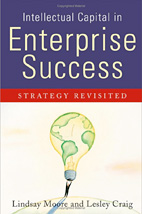Trade secrets can often be used to protect company knowledge and invention in instances where patent protection is either not desirable or available. For example, when trade secrets are viewed as an alternative to patent protection they are commonly invoked in instances where the 20 year life of a patent isn’t deemed to be sufficient, or where the knowledge should never be made public (cf. the famous Coca-Cola recipe).
Knowledge Management
Fundamentally, all intellectual capital assets are "knowled-based assets" built on specific knowledge or know-how.
Knowledge and Economic Growth
The rise of our entrepreneurial society, the information economy, global capitalism, and modern prosperity are all inextricably linked together with the cultivation, dissemination, and management of knowledge. Increasingly, knowledge itself and the transfer of knowledge, are widely recognized as the key factors in long-term economic growth.
What is Knowledge Management?
Peter Drucker, the great patriarch and founder of management as a discipline, famously coined the term “knowledge workers” during the mid-twentieth century. “Knowledge workers” were the people who were being paid to think, to work with their brains instead of their hands. Fifty years later, such “knowledge workers” have become the lifeblood of our economy, and are approaching 60% of all workers in the United States.
Traditional Knowledge – Be Careful What You Claim to Own (PDF)
As Chinese and Ayurvedic medicine and indigenous substances increasingly influence the creation of new foods and dietary-supplements products, it becomes important to understand how the traditional knowledge movement is shaping the structure of new products, and limiting the opportunity to capitalize upon the cultural knowledge of other cultures. What is this trend and what does it suggest for business strategy?


 As the knowledge-based economy expands, the companies and individuals that possess intangible intellectual assets, such as intellectual property, will need specialized expertise, strategic thinking, legal experience, and the wisdom necessary to manage intellectual assets.
As the knowledge-based economy expands, the companies and individuals that possess intangible intellectual assets, such as intellectual property, will need specialized expertise, strategic thinking, legal experience, and the wisdom necessary to manage intellectual assets.